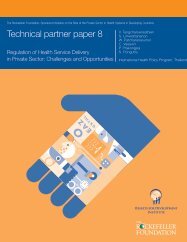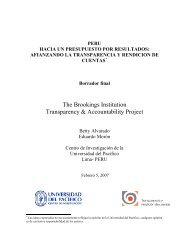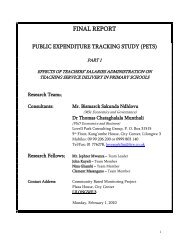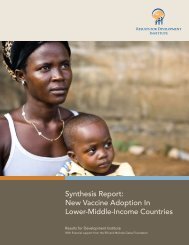Innovative Secondary Education For Skills Enhancement
Innovative Secondary Education For Skills Enhancement
Innovative Secondary Education For Skills Enhancement
Create successful ePaper yourself
Turn your PDF publications into a flip-book with our unique Google optimized e-Paper software.
Introduction: The Global Employment Picture<br />
By 2030 the global labor force will be 3.5 billion, an increase<br />
of 600 million from today. Sixty percent of this net<br />
increase will be in South Asia and Africa. Unless secondary<br />
education trends double or triple, one billion of the 3.5<br />
billion will lack secondary education, one-third in India<br />
and another quarter in Africa and the rest of South Asia.<br />
A recent overview suggests that the 2030 global workforce<br />
will contain a potential surplus of 90 to 95 million<br />
low-skilled workers, 58 million of them in developing<br />
countries. By contrast, there will likely be a shortage of 45<br />
million medium-skilled workers in developing countries,<br />
as industrialization raises demand but secondary education<br />
does not keep pace (McKinsey, June 2012).<br />
These long-term trends assume slower job growth in the<br />
past than in recent years, and come on top of a serious<br />
current youth unemployment situation. Everywhere,<br />
youth unemployment is higher than overall unemployment,<br />
and because youth make up such a large proportion<br />
of the population and labor force, the numbers of<br />
unemployed youth often exceed those of adults. In South<br />
Asia, for example, youth unemployment rates are three<br />
to four times as high as adult rates (Srivastava and Khare<br />
2012). Globally, youth unemployment in 2012 is about 75<br />
million, or a rate of 12.7 percent, varying from 28 percent<br />
in the Middle East to 13.5 percent in South Asia. <strong>Skills</strong><br />
mismatches are one important cause of unemployment in<br />
general—and of youth unemployment in particular. They<br />
are not the only cause, of course, with macroeconomic<br />
demand being a major factor. Persisting unemployment<br />
in the face of job vacancies, however, does indicate that<br />
there is some mismatch due to labor force entrants having<br />
inadequate skills.<br />
In Africa and Asia, the focus regions of this study, several<br />
trends are apparent. First, the proportion of workers in<br />
agriculture has fallen, but absolute numbers in agriculture<br />
remain roughly constant. Sixty-seven million non-farm<br />
jobs have been created in India, for example, since 2000,<br />
but the number employed in agriculture has remained<br />
constant at 240 million. Second, the demographic advantage<br />
countries in these regions have had could in the<br />
future become instead a major disadvantage, resulting in<br />
too many low-skilled workers.<br />
If education systems fail to respond more rapidly to changing<br />
economies, to expand sufficiently, and to become more<br />
relevant to employment, these skills mismatches seem<br />
likely to increase because of broader trends. Advances in<br />
technology are reducing the demand for low-skill and even<br />
some medium-skill jobs and certainly increase the frequency<br />
with which skills need to be upgraded.<br />
<strong>Skills</strong> and Individual<br />
Livelihoods 3<br />
<strong>Education</strong> and skills have strong economic benefits for<br />
people. Studies have looked at number of years in school,<br />
cognitive skills, and at non-cognitive skills. They have<br />
found an average 10 percent private return on individual<br />
earnings for each additional year of schooling and that<br />
the returns to education overall have evolved depending<br />
on the education level and have especially increased for<br />
postprimary education in growing economies, as schooling<br />
levels have increased overall. Beyond just years of<br />
education, there is increasing evidence that cognitive skills<br />
(as measured by standardized literacy tests) are strongly<br />
and significantly associated with individual earnings in<br />
both developed and developing countries. Similarly noncognitive<br />
skills are also highly positively associated with<br />
productivity and earnings in developing countries on the<br />
whole. Private returns to both years of schooling and to<br />
cognitive skills are generally higher in developing than in<br />
developed countries, partly reflecting the greater scarcity<br />
of schooling and of skills in the developing world.<br />
Similarly these returns in developing countries tend to be<br />
higher for women than for men, again reflecting relatively<br />
lower school attendance and so learning by women. This is<br />
in part because women may need only basic literacy skills<br />
to obtain high-paid employment whereas men need higher<br />
levels of literacy. One important study in Pakistan showed<br />
that, for women, the returns to skills were stronger than<br />
those to schooling, but with the opposite result for men,<br />
implying that for men school provides a credentialing that<br />
is missing for women. No long-term trend data are available<br />
for developing countries, but data for OECD countries<br />
does show that the effect of cognitive (literacy) skills on<br />
individual earnings has increased in the last three decades.<br />
Other important findings about specific cognitive skills<br />
include that numeracy skills have particularly high returns<br />
as do computing skills, both across different levels of<br />
development. The evidence on non-cognitive skills is still<br />
3 This section and the one that follows draw heavily on Guison-Dowdy (2012).<br />
10 <strong>Innovative</strong> <strong>Secondary</strong> <strong>Education</strong> <strong>For</strong> <strong>Skills</strong> <strong>Enhancement</strong> (ISESE)
















